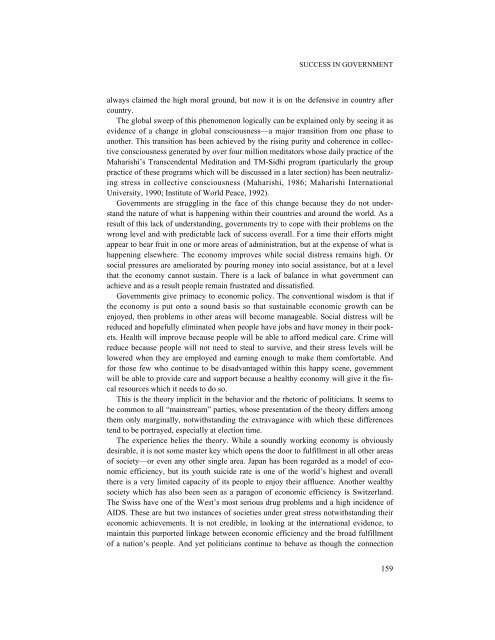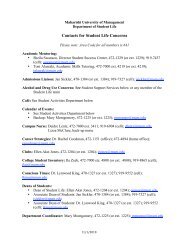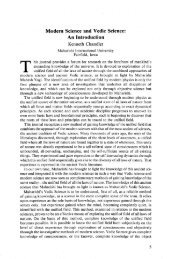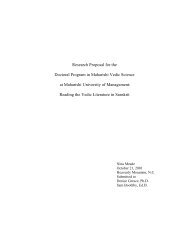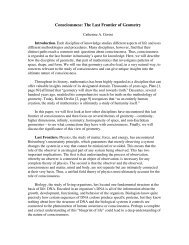Success in Government - Maharishi University of Management
Success in Government - Maharishi University of Management
Success in Government - Maharishi University of Management
You also want an ePaper? Increase the reach of your titles
YUMPU automatically turns print PDFs into web optimized ePapers that Google loves.
SUCCESS IN GOVERNMENT<br />
always claimed the high moral ground, but now it is on the defensive <strong>in</strong> country after<br />
country.<br />
The global sweep <strong>of</strong> this phenomenon logically can be expla<strong>in</strong>ed only by see<strong>in</strong>g it as<br />
evidence <strong>of</strong> a change <strong>in</strong> global consciousness—a major transition from one phase to<br />
another. This transition has been achieved by the ris<strong>in</strong>g purity and coherence <strong>in</strong> collective<br />
consciousness generated by over four million meditators whose daily practice <strong>of</strong> the<br />
<strong>Maharishi</strong>’s Transcendental Meditation and TM-Sidhi program (particularly the group<br />
practice <strong>of</strong> these programs which will be discussed <strong>in</strong> a later section) has been neutraliz<strong>in</strong>g<br />
stress <strong>in</strong> collective consciousness (<strong>Maharishi</strong>, 1986; <strong>Maharishi</strong> International<br />
<strong>University</strong>, 1990; Institute <strong>of</strong> World Peace, 1992).<br />
<strong>Government</strong>s are struggl<strong>in</strong>g <strong>in</strong> the face <strong>of</strong> this change because they do not understand<br />
the nature <strong>of</strong> what is happen<strong>in</strong>g with<strong>in</strong> their countries and around the world. As a<br />
result <strong>of</strong> this lack <strong>of</strong> understand<strong>in</strong>g, governments try to cope with their problems on the<br />
wrong level and with predictable lack <strong>of</strong> success overall. For a time their efforts might<br />
appear to bear fruit <strong>in</strong> one or more areas <strong>of</strong> adm<strong>in</strong>istration, but at the expense <strong>of</strong> what is<br />
happen<strong>in</strong>g elsewhere. The economy improves while social distress rema<strong>in</strong>s high. Or<br />
social pressures are ameliorated by pour<strong>in</strong>g money <strong>in</strong>to social assistance, but at a level<br />
that the economy cannot susta<strong>in</strong>. There is a lack <strong>of</strong> balance <strong>in</strong> what government can<br />
achieve and as a result people rema<strong>in</strong> frustrated and dissatisfied.<br />
<strong>Government</strong>s give primacy to economic policy. The conventional wisdom is that if<br />
the economy is put onto a sound basis so that susta<strong>in</strong>able economic growth can be<br />
enjoyed, then problems <strong>in</strong> other areas will become manageable. Social distress will be<br />
reduced and hopefully elim<strong>in</strong>ated when people have jobs and have money <strong>in</strong> their pockets.<br />
Health will improve because people will be able to afford medical care. Crime will<br />
reduce because people will not need to steal to survive, and their stress levels will be<br />
lowered when they are employed and earn<strong>in</strong>g enough to make them comfortable. And<br />
for those few who cont<strong>in</strong>ue to be disadvantaged with<strong>in</strong> this happy scene, government<br />
will be able to provide care and support because a healthy economy will give it the fiscal<br />
resources which it needs to do so.<br />
This is the theory implicit <strong>in</strong> the behavior and the rhetoric <strong>of</strong> politicians. It seems to<br />
be common to all “ma<strong>in</strong>stream” parties, whose presentation <strong>of</strong> the theory differs among<br />
them only marg<strong>in</strong>ally, notwithstand<strong>in</strong>g the extravagance with which these differences<br />
tend to be portrayed, especially at election time.<br />
The experience belies the theory. While a soundly work<strong>in</strong>g economy is obviously<br />
desirable, it is not some master key which opens the door to fulfillment <strong>in</strong> all other areas<br />
<strong>of</strong> society—or even any other s<strong>in</strong>gle area. Japan has been regarded as a model <strong>of</strong> economic<br />
efficiency, but its youth suicide rate is one <strong>of</strong> the world’s highest and overall<br />
there is a very limited capacity <strong>of</strong> its people to enjoy their affluence. Another wealthy<br />
society which has also been seen as a paragon <strong>of</strong> economic efficiency is Switzerland.<br />
The Swiss have one <strong>of</strong> the West’s most serious drug problems and a high <strong>in</strong>cidence <strong>of</strong><br />
AIDS. These are but two <strong>in</strong>stances <strong>of</strong> societies under great stress notwithstand<strong>in</strong>g their<br />
economic achievements. It is not credible, <strong>in</strong> look<strong>in</strong>g at the <strong>in</strong>ternational evidence, to<br />
ma<strong>in</strong>ta<strong>in</strong> this purported l<strong>in</strong>kage between economic efficiency and the broad fulfillment<br />
<strong>of</strong> a nation’s people. And yet politicians cont<strong>in</strong>ue to behave as though the connection<br />
159


